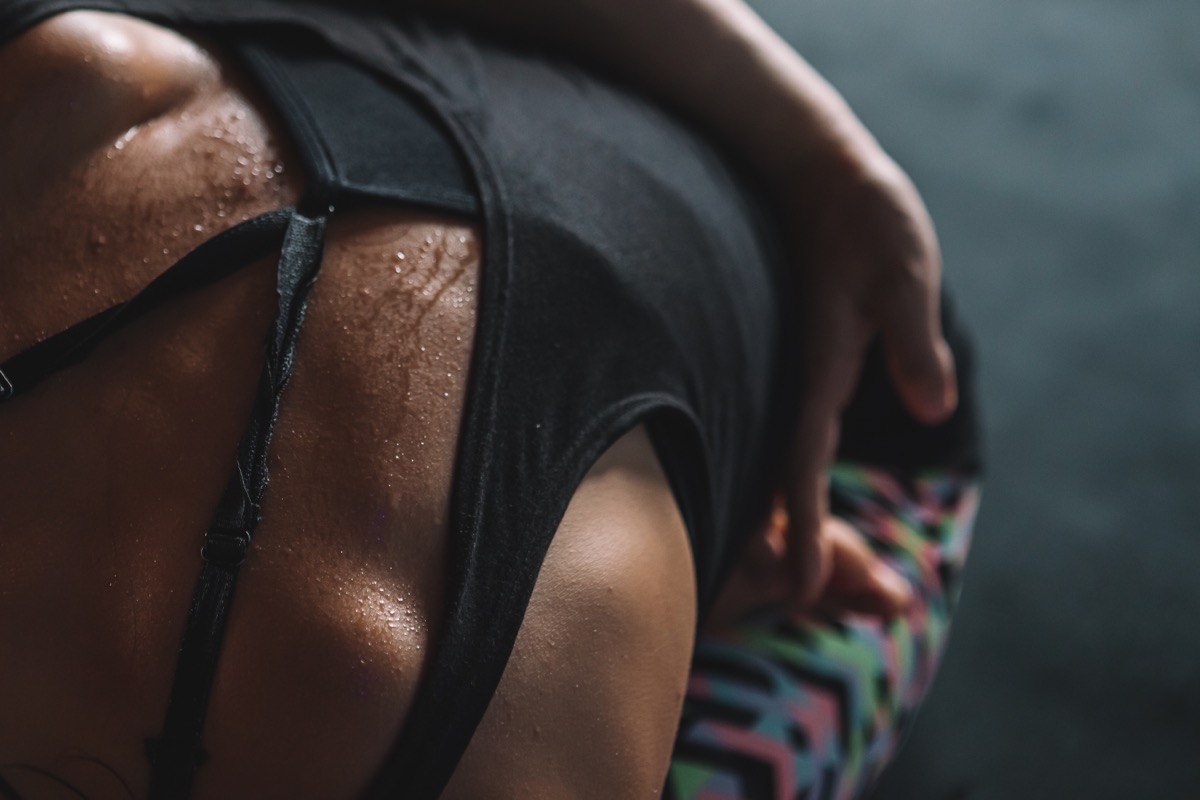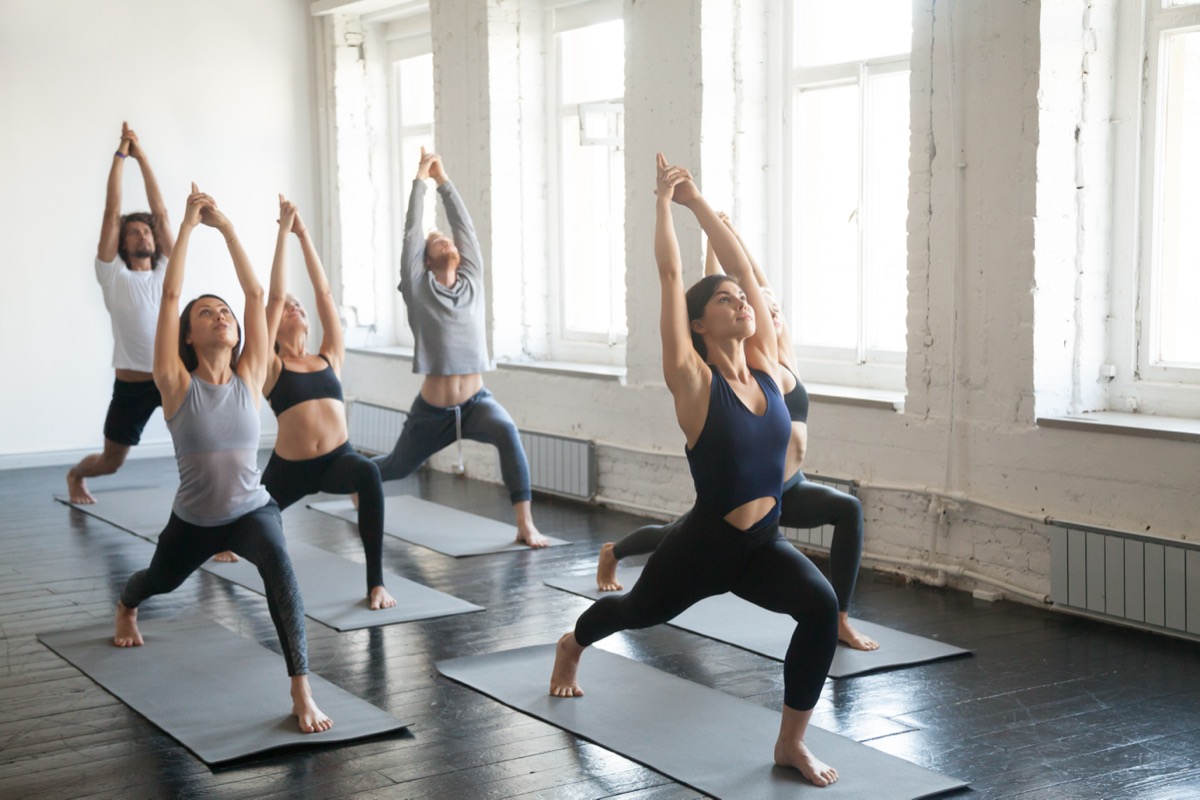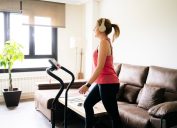Hot Yoga Can Reduce Depression by 50%, New Study Says—The Easy Way to Start
Turning up the heat can come with major mental health benefits.

When you're deep in the throes of depression, working out is probably the last thing you want to do. However, it's no secret that if you can dig deep and find the motivation, getting regular exercise can significantly improve your mental health. In fact, new research shows that hot yoga is especially beneficial.
A study published earlier this month in the Journal of Clinical Psychology found that joining weekly hot yoga classes for just eight weeks could significantly reduce depressive symptoms. Read on to find out how hot yoga could transform your mental health and why it comes with such unique benefits.
RELATED: Silent Walking Is the Latest Wellness Trend Everyone's Talking About.
Hot yoga can significantly reduce depression, a new study says.

The study gathered 80 participants with moderate-to-severe depression and split them into two groups. The first was asked to attend hot yoga classes twice weekly for eight weeks, while the control group was put on a "waitlist" for the classes.
The trial group participants ultimately showed up for fewer classes than the researchers had suggested—they took an average total of 10 classes over eight weeks—but they still saw major benefits from their participation. Roughly 60 percent of people placed in the hot yoga group reported a 50 percent decrease in depressive symptoms, using the Inventory for Depressive Symptomatology (IDS) to guide assessments. The majority of participants also spoke favorably about the impact of the classes in exit interviews.
RELATED: 7 Effective Ways to Control Your Anxiety, According to Therapists.
Hot yoga helps build resilience and self-esteem.

With the thermostat turned up to sauna-like levels, hot yoga challenges you to overcome both physical challenges and feats of mental endurance. Some experts believe that this is a key reason why it can improve depressive symptoms.
"The challenging environment of hot yoga, where individuals may face discomfort and adversity, can help build mental resilience," explains Ryan Sultan, MD, a board-certified psychiatrist, therapist, and professor at Columbia University. "Overcoming physical and mental obstacles in hot yoga classes can empower individuals to cope with the challenges they encounter in their daily lives, including those related to depression."
Bayu Prihandito, an RYT 200-certified yoga instructor, life coach, and the founder of Life Architekture, agrees that by overcoming these physical and mental challenges, many people will notice a boost to their "self-esteem, confidence, and sense of accomplishment." He adds that the intense focus required in hot yoga can act as a form of meditation, ultimately helping to ground people in the present.
There are also physiological benefits to adding heat to your yoga practice.

Raising the room's temperature while you do yoga may also help reduce depressive symptoms by providing certain physiological benefits.
"The heat itself can promote relaxation and reduce muscle tension, which can be particularly helpful for individuals with depression who may experience physical symptoms such as muscle pain and tension," explains Sultan. "The heat can also help individuals get into deeper stretches, potentially leading to a more intense release of endorphins, which are the body's natural mood lifters."
RELATED: 15 Life-Changing Habits to Add to Your Wellness Routine.
A holistic approach to treatment is best, experts say.

Hot yoga won't singularly "cure" your depression, but it can be used as part of a broader, more holistic plan to improve your mental health.
"Remember that hot yoga can be a valuable addition to your mental health treatment plan, but it should not be considered a standalone solution for depression. It is most effective when used in conjunction with other therapeutic approaches, such as medication and psychotherapy, for a comprehensive treatment strategy," advises Sultan.
Safety is key.

If you're considering adding hot yoga to your self-care routine, it's important to consult with your team of healthcare professionals before getting started. This should include both your general practitioner, who can help you assess safety given any pre-existing medical conditions you may have, as well as your psychiatrist or therapist.
Sultan adds that you should ease into your yoga or hot yoga practice slowly, opting for beginner-level classes until you feel more comfortable. "Listen to your body, especially in the heated environment, to avoid pushing yourself too hard," the psychiatrist recommends. "Staying hydrated is also crucial, so be sure to drink enough water before, during, and after your hot yoga sessions to prevent dehydration, which can worsen depressive symptoms."
For more wellness tips sent directly to your inbox, sign up for our daily newsletter.





















